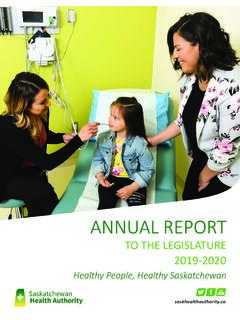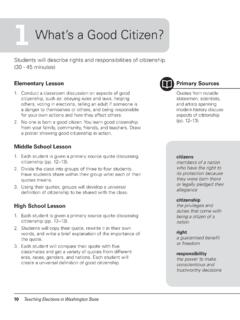Transcription of Review of Vocational Education - GOV.UK
1 Review of Vocational Education The Wolf Report Alison Wolf March 2011 Contents Foreword by the Secretary of State for Education Michael Gove MP 4 Foreword by the Minister of State for Further Education , Skills and Lifelong Lear ning John Hayes MP 6 Executive Summary 7 What we want to achieve 8 The wider environment 9 The way forward 10 Recommendations 13 Scope 19 Part One: Introduction 20 Part Two: The Social and Labour Market Context 24 1. The collapse of youth labour markets 24 The nature of the labour market 28 2. High returns to Education and qualifications 30 3. High returns to apprenticeship and employment 33 4. Occupational change 35 5. The implications of change (A): Young people s entry into the English labour market 36 The implications of change (B): How Education systems are adapting facts and misconceptions 39 The implications of change (C): challenges for Vocational Education 43 1 Review of Vocational Education The Wolf Report Part Three: The Educational Context 44 1.
2 Vocational Education in England 44 2. Key Issues A: Key Stage 4 46 3. Key Issues B: Upper Secondary, age 16-19 50 4. Key institutional features of 14-19 Education in England 54 A. The English qualification system 54 B. Examination boards and awarding bodies 55 C. Funding by qualifications 58 5. The regulatory framework 62 Part Four: An Audit of Current Provision 67 1. The mis-match between labour market requirements and Vocational Education provision 70 2. The mis-match between progression requirements and Vocational Education provision 80 Assessment and standards 94 3. Inadequate quality assurance and regulatory arrangements 96 Part Five: Recommendations 105 1. Introduction 105 2. Conceptualising 14-19 Education 106 3. Funding and Institutional Arrangements 119 A. Reforming 16-18 funding for educational institutions 120 B.
3 Reforming funding for apprenticeships 122 C. Strengthening the system: improving access to high quality Vocational instruction 126 4. Reforming the Regulatory Framework 132 Quality assurance 135 5. In conclusion 139 Part Six: Conclusions and Destinations 141 Appendix I: Growth in Vocational Qualifications 145 Most popular Vocational Qualifications at Key Stage 4: 2009-10 145 Appendix II: Changes in the English Labour Market 147 Appendix III: Returns to Low-level Vocational Qualifications 150 Appendix IV: Regulation and Inspection of Vocational Education 155 Appendix V: Further examples of ho w English 16-18 Education is funded 158 2 Contents Appendix VI: Youth Pathways/LSYPE Charts in Full 160 Appendix VII: Apprenticeship figures and trends 164 Appendix VIII: Mathematics and English Post-16 170 Appendix IX: Extending the common core: the trend to delayed specialisation 173 Bibliography 176 Endnotes 185 Acknowledgements Many hundreds of people contributed evidence to this Review .
4 I cannot list them all but would like to thank them for their insights and honesty, and for the fascinating background material which so many also provided. Respondents expressed some very different opinions on a number of points, and so obviously my conclusions will not all please everyone. However, I would like to emphasise how seriously we took the evidence and submissions we received, and how much we appreciate people s willingness to contribute and help, and to alert me to relevant research and findings. I would also like to say how very much I enjoyed the visits I was able to make and to thank everyone involved in organising them. A number of people deserve special thanks. Stella Pearson, my secretariat, was as efficient and unflappable as it is possible for anyone to be. I would like to thank Glenna Pryor, who provided support from BIS, for her substantial help with the Review ; and Magdalen Meade for providing some superb figures to illustrate my argument.
5 A number of individuals Anna Vignoles, Hilary Steedman, Nick Linford, Alison Fuller, Amanda Spielman responded to last-minute appeals for help and information and I would like to record my gratitude. Analysts from DfE, YPLA and CAYT provided me with excellent statistical and analytic support and will, I hope, feel that I have understood and used their material appropriately. Finally, I am, of course, grateful to the Secretary of State for Education for inviting me to carry out this Review . It was an honour to do so, and I hope that its conclusions will help to improve the Vocational Education system of this country. 3 Review of Vocational Education The Wolf Report Foreword by the Secretary of State for Education Michael Gove MP Since prince albert established the Royal Commission in 1851 policy-makers have struggled with our failure to provide young people with a proper technical and practical Education of a kind that other nations can boast.
6 160 years later the same problems remain. Our international competitors boast more robust manufacturing industries. Our technical Education remains weaker than most other developed nations. And, in simple terms, our capacity to generate growth by making things remains weaker. Last year I asked Professor Alison Wolf to help us confront this long-standing problem by reviewing pre-19 Vocational Education . She has responded with this brilliant, and ground-breaking, report. She starts by confronting us with some stark truths. Far too many 14-16 year olds are doing courses with little or no value because performance tables incentivise schools to offer these inadequate qualifications. As a result between a quarter and a third of young people between the ages of 16-19 are, right now, either doing nothing at all or pursuing courses which offer no route to higher levels of Education or the prospect of meaningful employment.
7 She is correct to say these young people are being deceived and that this is not just unacceptable but morally wrong. This waste is a special tragedy because we know that encouraging genuine, high-quality, Vocational Education can guarantee access to further and higher Education and rewarding employment. The kind of courses which lead to a passionate understanding of, and commitment to, the joy of technical accomplishment are immensely valuable. We already know what good looks like. Apprenticeships at BT or Rolls-Royce are more oversubscribed than the most desirable course at the best university. These types of courses offer a route to good salaries and quick promotion at world-beating firms. What s more, many of the best courses like those offered by BT hold open the door for further study in higher Education . 4 Foreword by the Secretary of State for Education Michael Gove MP Professor Wolf argues that we need a wholesale realignment of incentives.
8 Performance tables, funding systems and regulatory compliance are all pushing in the wrong direction against the better judgment of teachers and lecturers working in our schools and colleges. To take one particularly shocking example: the system actively discourages 16-19 year olds from catching up with their English and Maths so that each year 300,000 18 year olds start adult life without the equivalent of a Maths or English GCSE. Implementing these reforms so that we get the structure right will not, as she acknowledges, be simple. It will take years. But if we are going to give all our young people the opportunities they deserve we must get it right. Thanks to Professor Wolf we now have a guide to get us there. Michael Gove MP, Secretary of State for Education . 5 Foreword by the Minister of State for Further Education , Skills and Lifelong Learning John Hayes MP Little makes more difference to people s lives than the empowerment they receive from Education .
9 But for those young people whose aptitudes and talents are practical, expectations are too often limited and opportunities restricted. For far too long Vocational learning has been seen as the poor relation of academic learning. While there have been many calls over the years for greater parity of esteem between academic and vocation qualifications, in practice this has meant making what is practical more academic, to the detriment of both. It is time, as the Secretary of State has said, that we recognise the inherent value of craftsmanship the intrinsic richness of manual work, practical and technical competences. Recognising the value of practical skills matters for individuals and our society, and it matters for our economy too. Our future prosperity depends on building an advanced economy founded on high-level technical skills. To extend individual opportunity and rebalance our economy we must raise expectations and unleash talent.
10 For those young people who choose the Vocational route it must be a highway, not a cul-de-sac. In September last year, the Secretary of State asked Professor Alison Wolf to investigate how we can ensure that Vocational Education provides for progression to higher learning and employment. Alison s report represents a fresh approach. Rather than advocating yet more qualification reform, it recommends that we embrace and extend the forms of Vocational learning we know work well, both here and abroad. In particular, Alison identifies Apprenticeships as a key route to skilled employment and national prosperity. To deliver economic growth with all that means for standards of living and communal wellbeing we must prioritise Vocational learning, promote Apprenticeships and so produce a new generation of craftsmen and women capable of building Britain s future. John Hayes MP, Minister of State for Further Education , Skills and Lifelong Learning.












